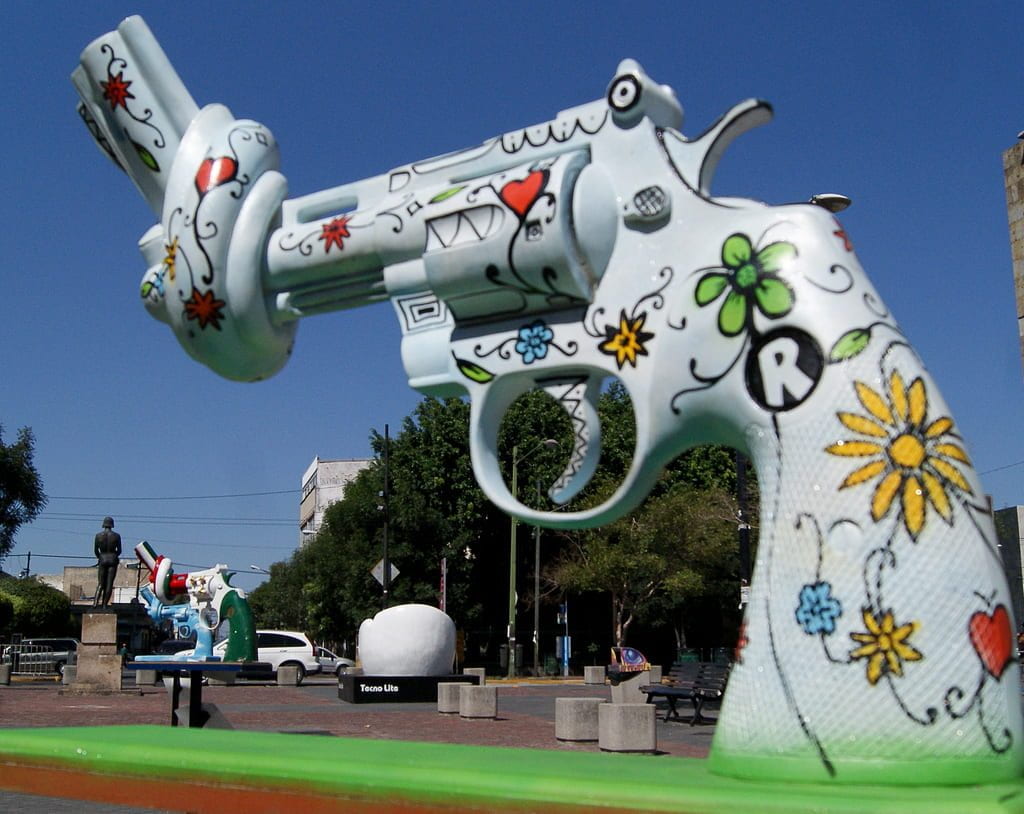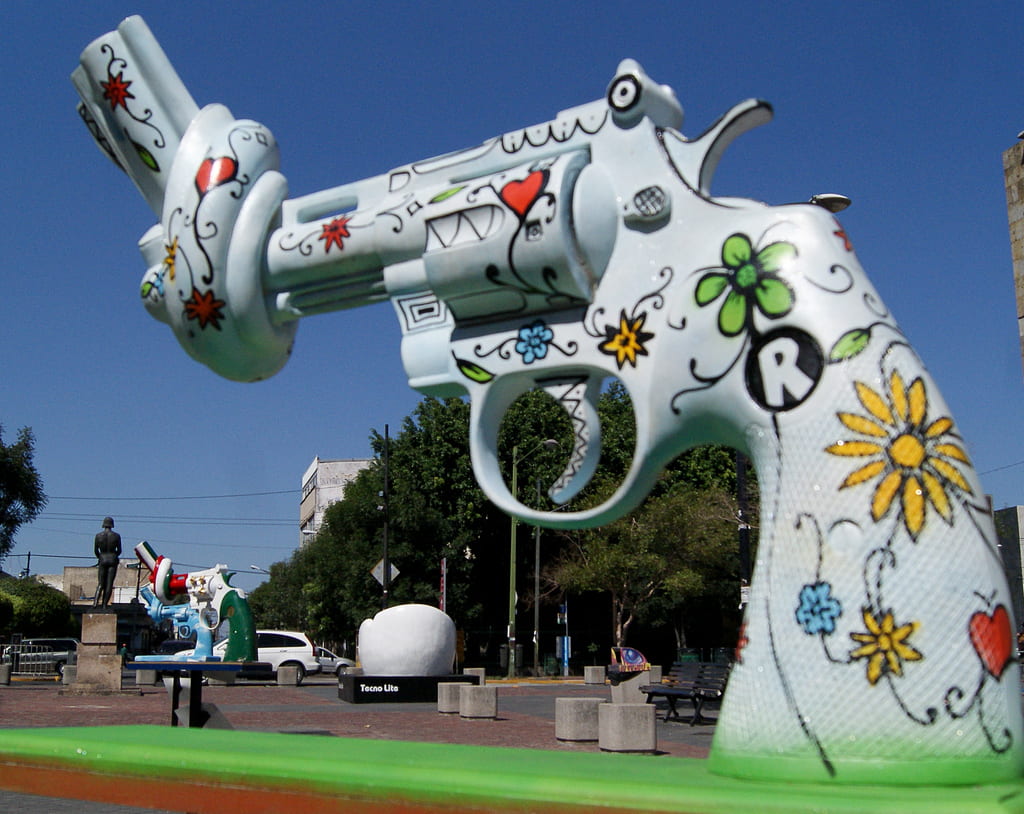**Due to the continuing tragedies of gun violence, especially in schools, and stalled legislation, our series on guns and gun control (from two months ago) will repost over this week.

The gun rights vs. gun control debate is again at the forefront of our national discourse after 17 people lost their lives in a school shooting in Florida last month. School shootings hit close to home for all of us, and especially those of us engaged in education or with school-aged children. As an educator and mother, this is very personal. We need this public discussion on what our children’s lives are worth to us, on guns, and laws and policies that will help protect us in cases of gun violence.
I have noticed that both sides invoke human rights when they advocate for either gun rights or gun control. The human rights case for gun control is pretty clear and straightforward. Gun control advocates base their claims on the most fundamental human right: the right to life and security of the person (Articles 6 and 9, International Covenant on Civil and Political Rights (ICCPR) and Article 3, Universal Declaration of Human Rights). Article 6 ICCPR very clearly states that “no one shall be arbitrarily deprived of his life” and that states have an obligation to ensure the security of all persons. School shootings fall within the realm of arbitrary taking of life, and therefore need to be addressed by the government. The government has a duty to protect people from these types of events. When the government fails to do so, we speak of a human rights crisis, which is what the Amnesty International has called gun violence in the United States.
The “other side”, namely the gun lobby and gun rights advocates, has used human rights language mostly in terms of “right to own a gun”. Gun control has been said to “be the ultimate human rights violation.” However, this rhetoric is highly problematic.
Let me be very clear:
There is no human right to gun ownership.
Human rights are essentially the opposite of guns. Here is why.
According to the preamble to the International Covenant on Civil and Political Rights (ICCPR), human rights “derive from the inherent dignity of the human person’ and are aimed at achieving ‘freedom from fear and want.” Human rights are moral rights with legal implications. They are about the value of each human life, and about people’s most basic needs. Access to food, water, housing, for example, or equal treatment before and under the law and not to endure discrimination on grounds of race, religion, ethnicity, sex or gender, national or social origin, and disability status. These rights are codified in international human rights treaties or part of customary international law.
The right to own a gun is not mentioned in any human rights document.
It is not part of customary international law or a general principle of law as recognized by the international community. It is not general state practice, which is what you would think following the debates in our own country. In fact, the United States is one of three countries in the world that has included the right to bear arms to their constitution, so it is quite an outlier.Therefore, the fact that the right to own guns is a constitutional right (although there is some debate over how to interpret the Second Amendment) does not mean it is a human right.
The reason the gun lobby is proposing a human right to gun ownership is easy to see. First, human rights are “sexy”, they are “in”. Their proposition reflects an overall trend to construct more and more issues in the language of human rights. Second, calling gun ownership a human right also strengthens their argument – who would not want their position to be supported by an inalienable right? But again, this is not what human rights are. You cannot simply take any individual right and call it a human right. As discussed above, human rights carry greater moral weight than individual rights by themselves. This might be splitting hairs to some, but it is an important distinction. It makes all the difference. Third, gun rights advocates often argue that not only is gun ownership is a human right, but also that the government cannot legally limit this right. That is not how rights work, regardless of whether we are talking about a human right or any other right.
No rights are absolute – they are limited by the rights of others. Governments can certainly limit rights, for national security reasons, for example, or to uphold public order, or to confront a health threat. Take freedom of speech as an example: You cannot say anything you want. You cannot incite murder, leak government secrets, or distribute child pornography. The idea that there is a human right to own guns and that this right is unlimited is incorrect.
But what about self-defense? Isn’t there a human right to individual self-defense from which the right to own guns would follow? This is where things get a bit more complicated. The academic literature contests whether self-defense is a human right. No international human rights treaties or resolutions mention the right to individual self-defense, which leads me to conclude that individual self-defense is not recognized by international law (unlike collective self-defense, which is the right of the state under Article 51 of the UN Charter). The right to life and physical security might imply that states must recognize an individual right to self-defense since states will never be able to defend all individuals from being harmed at all times. However,
the entitlements that flow from a human right are not the same as the human right itself.
For example, the right to work does not include a specific right to conclude a contract for employment. Or the right to freedom of movement does not liberate you from rush-hour traffic.
In short, the assertion that there is a human right to individual self-defense has dubious legal and moral foundations, and scant empirical support. The conclusion that this means there is a right to gun ownership for private citizens is clearly false. A conclusion like this would imply that guns are only be used in self-defense. However, studies have shown that guns are not used in self-defense as often as people claim. A recent study by the FBI showed that in 2012, only 259 homicides were justifiable (in self-defense), but 8,342 criminal gun homicides. In other words, for every one (1) justifiable homicide in the U.S. involving a gun, 32 criminal homicides occurred. This ratio does not take into account gun-induced suicides or fatal accidents involving guns. In other words, the assessment of gun rights cannot depend solely on their positive or negative impact on the right to self-defense, since no gun is inherently limited to defensive use.
Studies have clearly demonstrated that more guns mean more homicides (see here, here, and here). Individuals who have a gun are almost 5 times as likely to be shot in assaults than those who don’t have a gun. Other studies show that living in a home with guns is less safe than living in a home without guns (see here and here). Gun proliferation has a negative impact on the right to life and physical security and can lead to human rights violations. It is, therefore, important for the government to take action and regulate and hinder the proliferation of guns as part of its obligation to protect the right to life, as I explained above.
Human rights and guns do not go together. Using human rights to justify gun rights is not only wrong but it is dangerous. Human rights are about the lives of human beings, about freedom, liberty, and the betterment of these lives. Guns or “gun rights” have no place in human rights discourse; countering gun violence, engaging in public discussion, and instituting gun control do, however.
This is the mission of the March for Our Lives, which is scheduled for this Saturday, March 24, to raise awareness of the gun violence in schools. The March’s mission statement reads: “Not one more. We cannot allow one more child to be shot at school. We cannot allow one more teacher to make a choice to jump in front of a firing assault rifle to save the lives of students. We cannot allow one more family to wait for a call or text that never comes. Our schools are unsafe. Our children and teachers are dying. We must make it our top priority to save these lives.”

